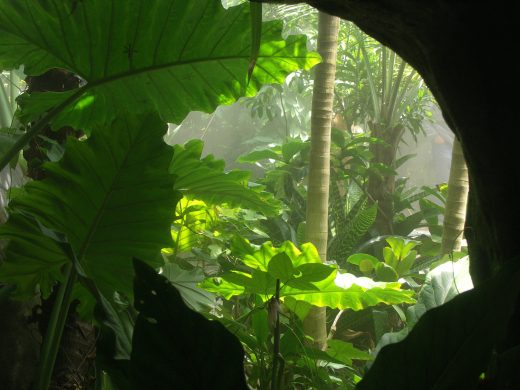Ny forskning: Når vi i fremtiden bliver flere på kloden vil det kræve større landbrugsarealer at brødføde alle. Det vil gå ud over naturen og kræver derfor en markant omlægning af vores måde at producere mad på.
Human population growth and associated food demand will likely take a heavy toll on tropical ecosystems unless major shifts occur in how crops are produced and consumed, warns a new review published in Trends in Ecology & Evolution, Mongabay.com writes Thursday.
Effects of projected population growth
Noting that projections published by the U.N. now forecast the human population to swell to 11 billion before the end of the century, William F. Laurance, Jeffrey Sayer, and Kenneth Cassman highlight potential impacts of agricultural expansion on biodiversity in the tropics.
“This growth, in concert with rising per-capita consumption, will require large increases in food and biofuel production,” they write. “We foresee (i) major expansion and intensification of tropical agriculture, especially in Sub-Saharan Africa and South America; (ii) continuing rapid loss and alteration (forandring) of tropical old-growth forests, woodlands, and semi-arid environments; (iii) a pivotal (altafgørende) role for new roadways in determining the spatial extent of agriculture; and (iv) intensified conflicts between food production and nature conservation.”
Cheap tropical land expected to be targeted
The authors cite research suggesting that global food demand could double by mid-century, necessitating anywhere from 120 million to a billion hectares of new cultivated areas. Most of the expansion is expected to occur in the tropics, where land is cheaper and recent innovations have enabled agribusiness to dramatically scale-up productivity. The Amazon and Congo Basins, dry woodlands of West Africa, and Cerrado and Chaco of South America will be particularly targeted.
The problem, argue the authors, is these regions are characterized by high levels of biodiversity and provide critically important ecosystem functions. Therefore conversion of these habitats will have a disproportionate ecological impact.
Business as usual will doom global biodiversity
“Tropical ecosystems are crucial for global biodiversity and provide vital ecosystem services, but are facing unprecedented pressures,” they write. “The already-massive global footprint of agriculture is expanding rapidly, especially in Sub-Saharan Africa and South America. Its impacts on terrestrial and aquatic ecosystems will be intense and increasingly pervasive.”
In other words, business-as-usual approaches to agricultural expansion seem certain to doom many species and habitats to extinction. To avoid this fate, the researchers call for new strategies that foster “more ecologically efficient food production while optimizing the allocation of lands to conservation and agriculture.”
“We can still identify urgent priorities to protect tropical nature–limiting destructive road expansion into the last surviving wildernesses; protecting nature reserves and their imperiled surrounding habitats; and working actively to slow burgeoning population growth, especially where current population trajectories are likely to elevate human suffering and environmental harm,” they write. “To avoid environmental calamity, we must achieve ambitious goals for agriculture while limiting the threats to tropical nature.”
Se forskningsartiklen publiceret i Trends in Ecology and Evolution her.














